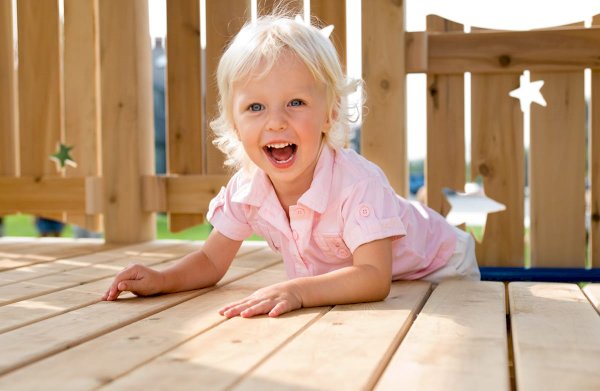Please enter email & zip
to see prices, view wishlist, and more

CedarWorks playsets are made of the only wood that's naturally rot-resistant and naturally splinter-free. No other wood used in playsets, not even other species of cedar, combines these important benefits.
With Northern White Cedar, your children will never get splinters and they will never be exposed to the chemicals found in pressure treated and stained woods. Better yet, you don't need to do anything to maintain the long life and splinter free character of the wood. So, just kick back and enjoy the fun your family will have for years to come.
When your playset arrives, the Northern White Cedar will have a pleasing light color. The surface will gradually weather to a classic silver-gray unless you choose to stain the wood.
Once it has reached this stage, you may choose to brighten the color by gently washing the playset with a bleach and water solution (see below). This is also an effective way to eliminate any mildew that may darken the wood.
If you don't like the silver-gray look, or if your playset is darkened by shade or mildew, clean up is quick and easy. Just use a 75% water/25% bleach solution and a spray bottle. Much of the original color will return once the wood has dried.
If you prefer to have a golden tone to your Northern White Cedar, you may apply a clear stain containing UV inhibitors before the wood starts graying. However, other than color preference, there is absolutely no need to take this step. Left alone, the cedar will remain splinter-free and rot-resistant naturally and will never need to be sanded or treated with preservatives.
Please keep in mind that if you do opt to stain the wood, you should plan to repeat it every year.
Every 4x4, 4x6, and round log in a CedarWorks playset has the heartwood of a tree at its center, and that’s the source of its remarkable strength. The sapwood around the heartwood dries more quickly than the heartwood and sometimes undergoes a process called "checking".
This natural phenomenon, which produces separations on the surface of the wood, is common to all wood species.
799 Commercial Street
PO Box 990
Rockport ME 04856-0990
(800) 462-3327
(207) 596-1010
8:30am - 5:00pm (EST) Mon-Fri
9:00am - 4:30pm (EST) Sat
Product Search
Please enter email & zip
to see prices, view wishlist, and more
Catalog Mailing Address

Act Fast Offer! 2 Free Chairs!
Receive 2 free chairs with your playset purchase just by entering email and zip.